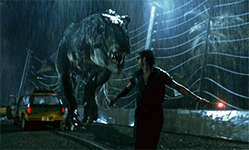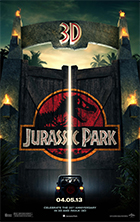Jurassic Park [3D Re-Release]
|  Seeing Steven Spielberg’s Jurassic Park on the big screen for the first time since the summer of 1993—when I saw it with a jammed-to-the-walls Friday night audience that was like one live wire, completely frazzled by the time the end credits rolled—confirms both Spielberg’s mastery of cinematic thrills and the comparatively empty bombast of today’s summer tentpole movies, even the better ones. Seeing Steven Spielberg’s Jurassic Park on the big screen for the first time since the summer of 1993—when I saw it with a jammed-to-the-walls Friday night audience that was like one live wire, completely frazzled by the time the end credits rolled—confirms both Spielberg’s mastery of cinematic thrills and the comparatively empty bombast of today’s summer tentpole movies, even the better ones.The irony, of course, is that so many of those movies are the direct descendent of Jurassic Park, which took the digital breakthroughs of James Cameron’s The Abyss (1989) and Terminator 2: Judgment Day (1991) to unimagined new levels. What so many of today’s action blockbusters lack is Spielberg’s patience, visual elegance, and understanding of narrative rhythm. Filmmakers today are so anxious to wow us with the intensity of their CGI spectacle that they overwhelm us, sometimes from the opening frames. In Jurassic Park, Spielberg understands the fine art of the tease—showing us little bits and flashes of what is to come, racheting up the tension to the point that, when he delivers the goods, we are anxious to see them. He learned the hard way in Jaws (1975), whose mechanical shark tended to sink to the bottom of Nantucket Sound as often as it perform its on-screen duty, that sometimes delaying the fulfillment of audience desire for just the right amount of time is key to making a thrill ride soar. Based on the best-selling novel by Michael Crichton, the rights to which Spielberg snapped up when it was still in the galley stages just as he had done with Jaws, Jurassic Park suggests the alluring possibility of raising dinosaurs from extinction via the science of DNA. The majority of the action is set on a fictional island 100 miles off the coast of Costa Rica, where a billionaire entrepreneur named John Hammond (Richard Attenborough) has built the ultimate theme park/zoo filled with every species of dinosaur imaginable, all resurrected from dino blood captured from prehistoric mosquitoes trapped in amber. The park, which has been developed under a cloud of secrecy, has yet to open, and because Hammond’s investors are anxious about its stability, he brings in a team of experts for a weekend demonstration. The team includes Dr. Alan Grant (Sam Neill), a paleontologist; Dr. Ellie Sattler (Laura Dern), a paleobotonist; and Dr. Ian Malcolm (Jeff Goldblum), a theoretical mathematician whose strong belief in chaos theory portends the disaster to come. Accompanied by a dollar-sign-chasing lawyer (Martin Ferrero) and Hammond’s adolescent grandchildren, Tim (Joseph Mazzello) and Lex (Ariana Richards), Dr. Grant and company set out on the park’s first guided tour, which quickly devolves from simple malfunctions and start-up issues to full-fledged calamity—exactly the kind of chaos about which Dr. Malcolm is constantly warning. A significant part of the problem comes from backroom espionage conducted by Denis Nedry (Wayne Knight), the park’s computer guru who feels that he isn’t being properly compensated and conspires to steal dinosaur embryos, which requires his shutting down many of the park’s safety mechanisms (including its miles of electrified fences) for his escape. Soon, a ravenous Tyrannosaurus Rex is lumbering out of its enclosure and chasing down anything that moves and trio of lethal Velociraptors is demonstrating just how effective they can be when hunting in packs. At its heart, Jurassic Park is a revenge-of-nature cautionary tale, a latter-day descendent of the rash of ’70s horrorshows that followed in the wake of Alfred Hitchcock’s The Birds (1963) and found its apotheosis in Spielberg’s Jaws, which effectively scared an entire generation out of the ocean. At first, Dr. Malcolm is the only one to recognize the scientific hubris of resurrecting species that nature selected for extinction (“The dinosaurs had their chance,” he says) and putting them in contact with humankind, thus instantaneously erasing 65 million years of evolution. When told by a slightly smug Jurassic Park scientist (B.D. Wong) that there is no way the dinosaurs can breed because they are all female, Dr. Malcolm still insists that life finds a way to break out. All human attempts at “population control” via chromosomal manipulation are doomed to failure because nature always has the last say. Like Jaws, Jurassic Park reminds us that, despite all our intelligence and technological prowess, we are ultimately at the mercy of the forces of nature. Philosophically speaking, Jurassic Park is more Werner Herzog than Walt Disney, but most viewers probably won’t notice because they’re too enthralled with the action and suspense. The screenplay by Crichton and David Koepp (who went on to co-write all three of Christopher Nolan’s Batman films) is a slow-burn, purposefully building the narrative in bits and pieces before we realize how all the characters and situations come together. But, once the film hits the midway point and the dinosaurs start to break loose on a dark night of torrential rain and thunder, Spielberg demonstrates that, when it comes to white-knuckle intensity, no one does it better. The second half of the film piles one breathless setpiece on top of another, highlighted by the Tyrannosaurs Rex overturning Ford Explorers like toy cars and the fleet-footed Velociraptors hunting the children in a shiny stainless steel kitchen. Spielberg is genuinely ruthless in his thrills, and he saves some of the film’s most traumatizing moments for Tim and Lex, thus making them fraternal brother and sister to Spielberg’s other cinematic children who have faced and survived (maybe) the horrors of the world (both real and fantastical) in Jaws, E.T. (1982), Poltergeist (1982), and Empire of the Sun (1987). The first child to be traumatized in the film gets it directly from Dr. Grant, who silences the kid’s dismissal of a Velociraptor as being like a “giant turkey” with a sadistic, methodical recounting of how a pack of Velociraptors would hunt him, gut him, and eat him while he was still alive. The scene has a rich undertone of gallows humor, which describes the film’s sense of comedy as whole, much of which comes from Goldblum’s wise-cracking Dr. Malcolm (although Spielberg also provides one of his most indelible visual gags with the T-Rex bearing down in a side mirror just above the label that “objects in the mirror are closer than they appear”). Amazingly, the digital effects that were so new in 1993 still look fresh and convincing in 2013, perhaps even moreso than many of today’s films because Spielberg uses them sparingly and thoughtfully, rather than just throwing pixels at the screen in mass quantity. He also knows to mix the CGI (most of which was pioneered by Industrial Light & Magic maestro Dennis Muren) with practical effects, including life-size animatronic dinosaurs created by Stan Winston (The Terminator). The result is a film that still works like gangbusters in terms of inducing spontaneous chair-arm gripping and breath holding, while time has allowed us to even better appreciate the nuances of Spielberg’s storytelling and the thematic undercurrents about the dangers of scientific and technological hubris. Note, for example, the way Hammond, who is so genial and jovial and grandfatherly in the opening passages, watches the others’ faces with a subtle look of gleeful perversity as a cow is lowered down into the Velociraptor pen—he’s enjoying his power to an unnerving degree. Notice also the mix of melancholy and catharsis in the film’s final moments, as Hammond looks down at the mosquito-in-amber headpiece on his cane, realizing silently that his dream is over, while Tim and Lex cuddle up next to Dr. Grant, the reluctant surrogate father figure who saw them through the horrors. John Williams’ signature music may start soaring on cue, but there is still a twinge of pain and regret, as we realize that the helicopter flying off into the sunset is not a moment of triumph, but one of mere survival in the face of nature unleashed. Copyright ©2013 James Kendrick Thoughts? E-mail James Kendrick All images copyright © Universal Pictures |
Overall Rating: 


 (3.5)
(3.5)


